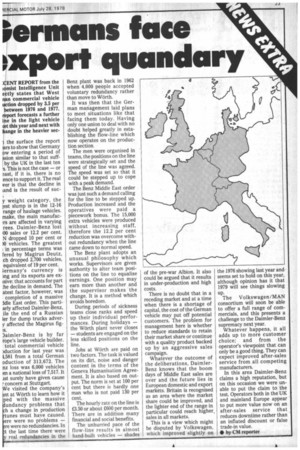ermans face xport quandary
Page 25

If you've noticed an error in this article please click here to report it so we can fix it.
ENT REPORT from the i mist Intelligence Unit e tly states that West n commercial vehicle tion dropped by 3.5 per tween 1976 and 1977. port forecasts a further e in the light vehicle t this year and next with ange in the heavier see the surface the report rs to show that Germany w entering a period of ion similar to that suff by the UK in the last ten Ls. This is not the case — or east, if it is, there is no ence to support it. The real ver is that the decline in 'and is the result of suc y weight category, the ;est slump is in the 12-16 range of haulage vehicles. make, the main manufacTs are affected in varying rees. Daimler-Benz lost 00 sales or 12.2 per cent. N dropped 10 per cent or FO vehicles. The greatest , in percentage terms was fered by Magirus Deutz, ch dropped 2,700 vehicles, equivalent of 19 per cent.
■ rermany's currency is mg and its exports are exisive: that accounts for part :he decline in demand. The atest factor, however, was completion of a massive Idle East order. This partiarly affected Daimler-Benz, ile the end of a Russian ler for dump trucks advery affected the Magirus figs.
)aimier-Benz is by far rope's large vehicle builder. total commercial vehicle Auction for last year was 1,581 from a total German oduction of 313,672. The nz loss was 6,000 vehicles om a national loss of 7,517. It 1st surely have given cause r concern at Stuttgart.
We visited the company's Int at Worth to learn how it ped with the massive dundancy problems that ch a change in production rtunes must have caused. iere were no problems — ere were no redundancies. In the last time there were y real redundancies in the Benz plant was back in 1962 when 4.000 people accepted voluntary redundancy rather than move to Worth.
It was _then that the German management laid plans to meet situations like that facing them today. Having only one union to deal with no doubt helped greatly in establishing the flow-line which now operates on the production section The men were organised in teams, the positions on the line were strategically set and the speed of the line was agreed. The speed was set so that it could be stepped up to cope with a peak demand.
The Benz Middle East order was just such a demand calling for the line to be stepped up. Production increased and the operatives were paid a piecework bonus. The 15,000 extra vehicles were produced without increasing staff, therefore the 12.2 per cent reduction was overcome without redundancy when the line came down to normal speed.
The Benz plant adopts an unusual philosophy which works. Supervisors are given authority to alter team positions on the line to equalise earnings. One position may earn more than another and the supervisor makes the change. It is a method which avoids boredom.
During periods of sickness teams close ranks and speed up their individual performances. During holidays — the Wirth plant never closes — students are engaged on the less skilled positions on the line.
Jobs at Wiirth are paid on two factors. The task is valued on its dirt, noise and danger content in the terms of the Geneva Humanisation Agreement. It is also based on output. The norm is set at 100 per cent but there is hardly one man who is not paid 130 per cent.
The hourly rate on the line is £3.50 or about £600 per month. There are in addition many financial and social benefits.
The unhurried pace of the flow-line results in almost hand-built vehicles — shades of the pre-war Albion. It also could be argued that it results in under-production and high costs.
There is no doubt that in a receding market and at a time when there is a shortage of capital, the cost of the German vehicle may put off potential customers. The problem for management here is whether to reduce standards to retain their market share or continue with a quality product backed up by an aggressive sales campaign.
Whatever the outcome of the deliberations, DaimlerBenz knows that the boom days of Middle East sales are over and the future lies in European domestic and export markets. Britain is recognised as an area where the market share could be improved, and the lighter end of the range in particular could reach higher, sales in all markets.
This is a view which might be disputed by Volkswagen, which improved slightly on the 1976 showing last year and seems set to hold on this year, although opinion has it that 1979 will see things slowing up.
The Volkswagen/MAN consortium will soon be able to offer a full range of commercials, and this presents a challenge to the Daimler-Benz supremacy next year.
Whatever happens, it all adds up to more customer choice: and from the operator's viewpoint that can only be a good thing. They can expect improved after-sales service from all competing manufacturers.
In this area Daimler-Benz claims a high reputation, but on this occasion we were unable to put the claim to the test. Operators both in the UK and mainland Europe appear• to put more Value now on an after-sales service that reduces downtime rather than an inflated discount or false trade-in value.
• by CM reporter




























































































